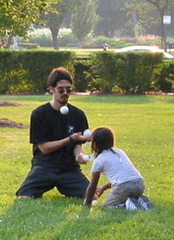Walking back from work at our temporary headquarters in Kimbima Hotel, I spotted a common sight in Sierra Leone and the developing world – a young relatively well-dressed girl escorting an elderly white male around. I ended up sharing a taxi with them part of the way up Lumley beach – the girl informing the clueless gentleman of the taxi-fare (three times the normal going rate) before they headed off to the open embrace of Bunker Beach Bar.
It’s an obvious guess that she was a prostitute. You see them all the time here – whether at Paddy’s – the notorious bar where UN staff such as myself are banned, Atlantic, or in the lobby of almost any hotel frequented by expats. Some are young; some are tall and skinny; some are short; and some are missing both hands.
Sometimes you just meet the pimps, like the teenage boys I met while wandering around the streets of Mopti and Bamako in Mali, eagerly offering up their “sisters” as “babies” where I could get “good sleep, no pay.”
They say wherever an army goes, prostitution follows. Perhaps, more accurately wherever humanity goes, prostitution follows. And in a country as impoverished as Sierra Leone, it’s easy to see why young girls and women capitalize on their comparative advantage in providing cheap sex to a mostly expat clientele… For a girl surviving a war without hands, why shouldn’t she, why wouldn’t she be willing to sell the rest of her body in order to survive?
As the taxi continued its way towards Lumley junction, it occurred to me that maybe the word prostitute or whore doesn’t even fit in many cases, at least not when one considers the origins of the words. The notion of sex for hire is actually not inherent in the etymology of prostitution; rather, “prostitution” has its roots in “sex indiscriminately offered” (fem. of prostitutus, pp. of prostituere, 1530). The dirtier and more offensive of the terms, “whore”, is derived from the Old English word hōra, which in term is from the Indo-European root kā meaning “desire” or “lust”, and the Proto-Germanic word khoraz (fem. khoron-) “one who desires.”
But many ‘prostitutes’ aren’t necessarily indiscriminate or lustful or desiring of sex. After all, they’re selling something – their body or sex – for something else. It’s anything but indiscriminate, and it’s not sex they’re after. Plenty of women and men in the US and worldwide give that away for free. We look down on prostitution because they’re exchanging something we believe shouldn’t be exchanged (sex and by implication self-respect, dignity) for money. Except in places like Sierra Leone, they may be exchanging sex for survival or some chance, no matter how slim, to escape from the grind of every day life, and that is something harder to ask someone to give up. Especially when all we have to offer is some esoteric ideal of human dignity and self-respect – a Kantian Kingdom of Ends far removed from the biting poverty of the here-and-now… And it is far removed from how the “civilized” world has functioned and continues to function. After all the exchange of sex/mating for stability (measured generally in terms of material comforts) has been a central feature of marriage and courtship and dating for time memorial.
But of course all this leaves out half of the picture, namely the elderly chap being led off to Bunker Beach bar – the clients or the “Johns”. The Johns are also exchanging something for sex but not nearly as much stigma is attached to the male clients that feed the industry. Because of the ingrained sexism of our language and culture, the names for Johns are not nearly as varied or colorful or insulting as those for whores, hookers, sluts, and strumpets. After all the clients don’t live in shanty towns and slums or learn to deftly manipulate clothing with the remaining stumps on their arms; instead, they return to their civilized professional careers as UN employees, NGOs workers, businessmen, lawyers, and politicians. But more than any prostitute, these men are exchanging money in order to be able to carry out their lust and fantasies. And they’re the ones continuing to feed a multi-billion dollar industry often based on the rape of children and modern day “comfort women”; a multi-billion dollar industry based on people choosing to turn themselves into an object to be sold on the market.
In the end, I don’t know if she was a prostitute… but I’m fairly certain he was a whore.
Wednesday, March 5, 2008
Subscribe to:
Post Comments (Atom)

1 comment:
good one. i think the names for males on the other side of the money exchange are also not flattering (males who sell sex, not buy it). i wonder whether any word we chose to use to describe prostitutes would become stigmatized because of how society views them. i wonder why the stigma isn't attached to buying sex. maybe because a lot more people buy sex than sell it?
Post a Comment